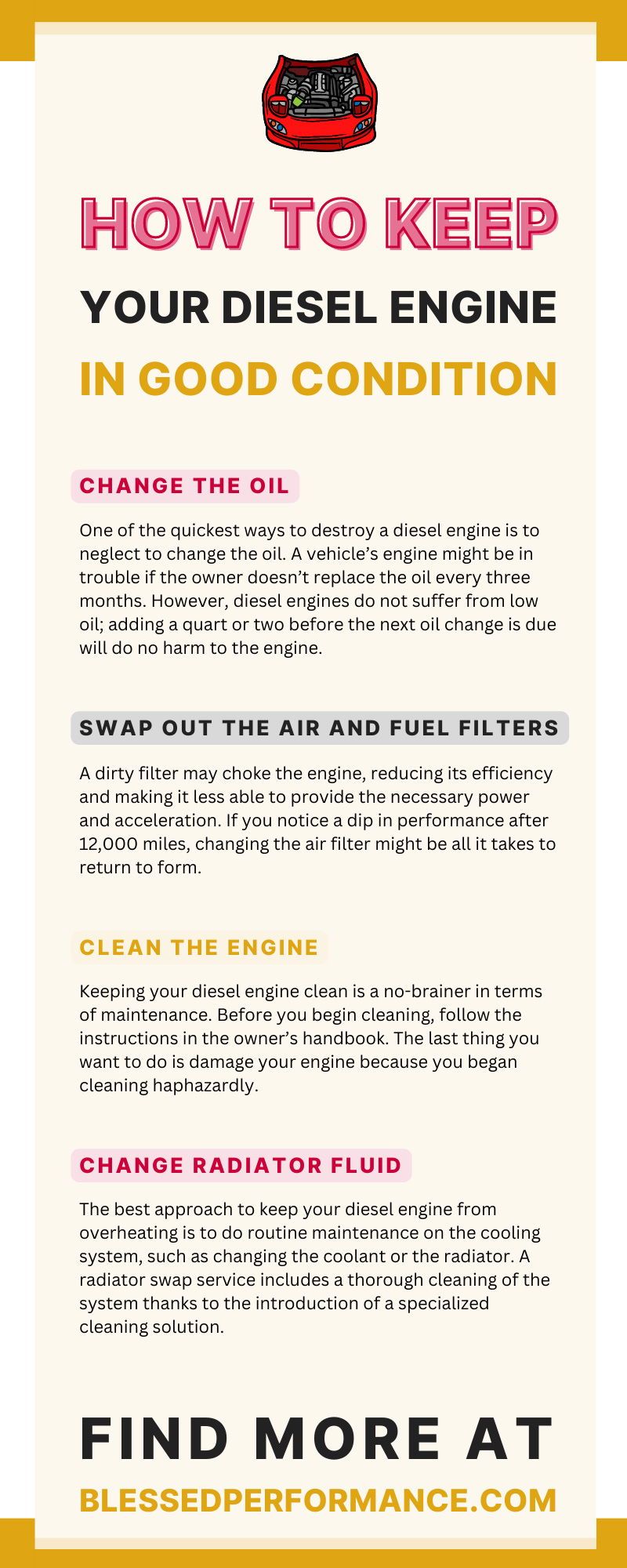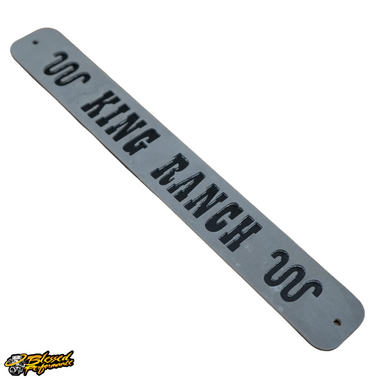How To Keep Your Diesel Engine in Good Condition
Estimated 0 min read
Diesel engines are fantastic in a variety of ways. Many people prefer diesel vehicles because they produce less harmful pollutants, get better gas mileage, and need less regular engine maintenance. And while all of that is accurate, failing to take care of your engine could lead to a rapid decline in performance. Learn how to keep your diesel engine in good condition so the problems are few and far between.
Change the Oil
One of the quickest ways to destroy a diesel engine is to neglect to change the oil. A vehicle’s engine might be in trouble if the owner doesn’t replace the oil every three months. However, diesel engines do not suffer from low oil; adding a quart or two before the next oil change is due will do no harm to the engine. However, changing it every few months will ensure everything functions optimally for as long as possible.
Swap Out the Air and Fuel Filters
While changing the oil, you can also check out the air filter. Most cars, diesel or otherwise, have the air filter tucked away in a rectangular cold air collecting box at the front of the engine bay.
A dirty filter may choke the engine, reducing its efficiency and making it less able to provide the necessary power and acceleration. If you notice a dip in performance after 12,000 miles, changing the air filter might be all it takes to return to form.
In contrast to gas-powered cars, diesel engines often include dual fuel filters: one located between the tank and the engine and another between the transfer pump and the injectors. Because diesel is less refined than gasoline, it is more likely to collect water from condensation in the fuel tank; hence many diesel engines use two fuel filters.
A few things may go wrong with your engine if diesel contains water particles: the engine’s power can drop, your vehicle will conk out, or there might even be an explosion.
You should change your diesel engine’s fuel filter and air filter simultaneously to get the most out of their performance and longevity.
Clean the Engine
Diesel engines might benefit from more regular cleaning than gasoline equivalents to maximize longevity. Most diesel-powered vehicles travel far distances while hauling heavy equipment on rugged terrain. Because of the rigors of the road, there are more possibilities for dirt and dust to show themselves on and around the engine.
Keeping your diesel engine clean is a no-brainer in terms of maintenance. Before you begin cleaning, follow the instructions in the owner’s handbook. The last thing you want to do is damage your engine because you began cleaning haphazardly.
In most cases, you’ll require a used toothbrush to help scrub those hard-to-reach places, a wet sponge for cleaning the engine compartment, and a special cleaner to eliminate grime without risk.
Always wait until the engine has cooled down before cleaning it, and always use safety equipment like goggles and gloves. If you want to know which parts of the engine you may safely hose off, you should consult your owner’s handbook. You can put all components in a plastic bag to prevent water damage if you want to err on the side of caution.
Change Radiator Fluid
A vehicle’s radiator dissipates engine heat into the surrounding air, keeping the inside cool. But how exactly does this cooling procedure function? As the engine runs, coolant circulates through it, and it begins to heat up. The coolant loops back to the radiator when it becomes too hot, releasing its heat into the atmosphere.
Overheating is a greater risk with diesel engines since they operate at higher temperatures than gas engines. Engine gaskets and cylinder seals can warp from overheating, which can cause catastrophic failure.
The best approach to keep your diesel engine from overheating is to do routine maintenance on the cooling system, such as changing the coolant or the radiator. A radiator swap service includes a thorough cleaning of the system thanks to the introduction of a specialized cleaning solution. Antifreeze also serves to remove rust and other contaminants while it also cools the system.
If you drive a diesel vehicle, you should probably change the radiator fluid every 50,000 miles, although this can vary greatly depending on the make and model. Don’t hesitate to have a qualified technician inspect the radiator if a hint of orange or green liquid seeps out. Or if there is a sweet aroma of maple syrup wafting from the engine steam rising from the engine bay.
Allow for a Cooldown
Letting the turbocharger cool down is essential for the continued health of your diesel engine. Allow at least 20 seconds of cooling down time after each trip. How long your drive has been will help determine this timing. If you are on the road for a while, it’s best to let the turbocharger cool for two minutes before continuing. How do you let your car cool off? When you reach your destination, park the vehicle in neutral and wait for the engine to cool down.
The turbocharger will last longer if you do this often. Turbochargers, like gasoline injectors, may be expensive; however, the exact cost can vary from vehicle to vehicle. When you hear whistling sounds and notice a noticeable drop in power, it’s time to replace your turbocharger. You may also see a bluish tinge to the exhaust emissions.
Fluid Reminders
Without engine oil, your vehicle could not keep chugging along and racking the miles. Lubricating the engine’s moving components is the job of engine oil. However, it becomes acidic and polluted with time, necessitating frequent replacement. The engine’s efficiency and lifespan will suffer without regular oil changes.
Engine coolant is equally crucial as engine oil, so keep an eye on it. A well-maintained cooling system will protect your engine from overheating, coolant freezing, and electrolysis in the cylinder liners. If you don’t keep up with your coolant maintenance, it may leak through the cylinder liner and into the cylinders.
Dangers of Old Man Winter
The procedures above are especially important during winter to prevent engine damage. Every time you leave the gas station, ensure the tank is full, and don’t let your vehicle sit in the cold for too long if the gas gauge shows less than half a tank. Replace the filter and inspect the engine for damage before winter sets in. This will allow you to get any necessary repairs done before the snow begins to fall.
Engine parts have a shorter lifespan and poor fuel efficiency when dirt accumulates. In addition, if you reside in a region with severe winters, the road salt used to combat ice and snow may accelerate the wear and tear on your engine’s components.
Finally, don’t forget to add window washer fluid. A filthy windshield is easy to acquire while driving fast on a wet or icy road, and in the summer, bugs may quickly smear your glass. Keep windshield wiper fluid in your reservoir; dirty windshields are a safety hazard.
You should make servicing your diesel engine a regular practice. Check your fuel levels every week and always monitor your mileage. If you do so, reaching 500,000 miles out of your 6.0 Powerstroke crate motor from Blessed Performance isn’t out of the question.










